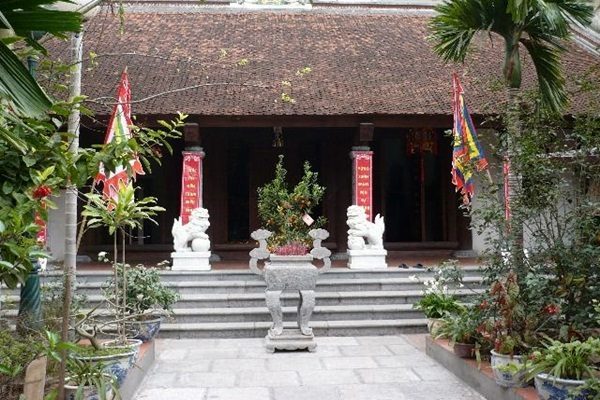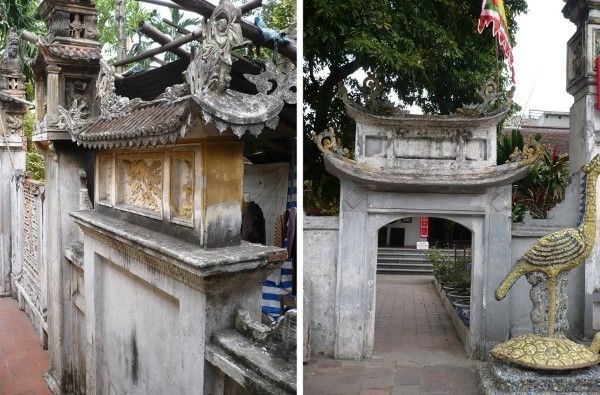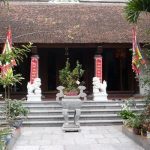HNP- Vua pagoda is located at No. 17 Thinh Yen Street, Pho Hue Ward, Hai Ba Trung District, Hanoi. Lying next to the bustling Troi market, the pagoda is one of the former Thang Long four Taoism houses. Especially, it is also considered as one “temple chess” of Thang Long as it was the place where several senior chess game had been taken place for hundreds of years. The Vua pagoda has been recognized as a unique relic of history – culture – sports of Vietnam.
Vua Pagoda is common name of Hung Khanh pagoda, Thien De Shrine worshiping Magha, Tran Hung Dao Temple and Mother Goddess Shrine in Thinh village, Hau Nghiem Quarter, Tho Xuong district, currently Thinh Yen Street, Hai Ba Trung District, Hanoi. The Vua pagoda relic contains the unique traditional cultures, in addition to functions as a place to worship traditional beliefs, the relic is also a place to promote and play a special sport named chess.
In the Le dynasty (1428 – 1527), the pagoda area was Thinh Yen village, which was the palace of Chancellor. It was the place where Hung Khanh pagoda dedicated to worship Buddha, a semi-circular lake with cool water and surrounded by green and shady trees were located. The Thinh Yen Village had long tradition of chess play. Its chess festival attracted various honorable people and chess fans. Among them, the emperor of the Le dynasty who was a talent in chess called upon people to make their contribution to construction of a temple next to Hung Khanh pagoda to worship the Magha Chess King. Since then, the Vua Pagoda has become the most well-known chess arena in Thang Long.
Going through the Triple Gate with a very beautiful bell tower, you will reach the chess arena which witnessed various magics in chess positions in annual chess contests. The chessboard is lime-drawn on a green stone yard. On normal days, the positions on the chessboard are occupied by bonsai pots whose body carries name of the chess pieces, such as king, guard, bishop, knight, rook, cannon, etc. Seen from the bell tower of the Triple Gate, you will feel the atmosphere of a chess game with the verse:
Rook and cannon pass the river during spring
They can lead the troop without being promoted to any rank
Leading horses to destroy the ancient palace
Suddenly calling upon elephants to hide magic tips…
After the chess arena, you will reach the Magha shrine. Located on its left is the Hung Khanh pagoda dedicated for worshiping Buddha. The Magha derived from Brahmanism religion in India. Then, Buddhism and Brahmanism met each other, and Magha became a God, he and the Jade Emperor became the two guardian gods. In the pagoda, Magha and the Jade Emperor (also known as Brahma) are carved in the shape of kings with cone clothes and crowns and stands on both sides of newborn Sakyamuni statue (according to the Book titled Visiting temple to respect Buddha, history and meaning of the decoration by Tran Nho Thin). In India, Magha is the god of thunder. But when he came into Vietnam, he became the a god capable of resurrection and the king of Chinese chess.


Remains left at the Vua pagoda
In many of our pagodas, the Magha are usually arranged to go together with Great Brahma, two standing on both sides of the Nine-dragon tower (ie. the newborn Shakyamuni waited for session by nine dragons) placed at the lowest altar of the Triple Jewels. The Magha and Great Brahma are two gods who frequently assisted Shakyamuni when he had not become a Buddha yet. The Magha is considered to be the strongest chess piece “Magha may win 2 rooks”. He often traveled, transformed himself and appeared everywhere in Three Natures in the world to eliminate plague, solve difficulties for people. Therefore, the adage has it that “Whoever wishes to live long, respect the Magha”.
Vua pagoda festival takes place during the 6th to 9th days of the first lunar month annually. The chess festival not only attracts local players but also those from neighboring countries including Laos, Cambodia and China. The festival is quite attractive, in addition to rituals often seen in other temples and pagodas, its very attractive activity is chess opening ceremony. On the first day of the competition (preliminary competition), the chess teams from various places shall assign their people to kowtow the king, and then have a chess match with a person in the competition organization committee. After the preliminary round, the players shall officially compete each other in next days. The competitions are held in a knockout fashion. Only the two best players shall compete each other on the last day and the winner shall be the one winning the final.
Previously, in front of the Gate to the Magha Shrine stood a brick stele. An elderly follower said that this stele is built on the previous stele house dedicated to honor winners of chess games. The rules of the the Chess Festival in the Vua Pagoda stipulated that those winning the first prize in three consecutive years would have their names on this stele.. However, during the war against French and Americans, the stele house was destroyed. Nowadays, the new stele which has been built is still cursory and has no name listed yet.
The 9th day of the first lunar month is the main festive day. Right from very early morning, we can see a lot of people visiting the pagoda to wish for their health, happiness, peace and success, and also to choose the best positions to watch the final of the chess tournament. The final takes place right after the incense offering ceremony of the masses of people from all regions. For many years, the chess game at the Vua pagoda has been done in the form of international competition, within one hour, each player must have 20 moves, and those failing to do so will get reduced points. At the end of the day, the winner shall be named by the organizer and solemnly presented with the prize.
Nghi Dung

